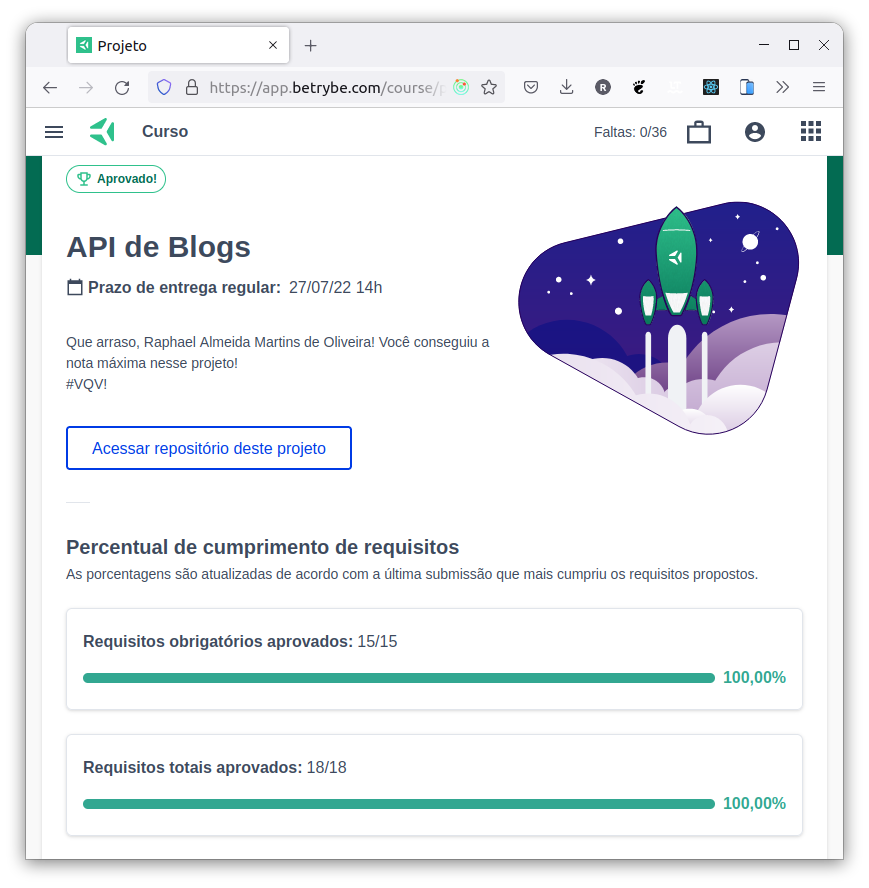🇺🇸 English
Node.js and Express.js project developed by Raphael Martins at the end of Unit 24 (Back-end Development Module) of Trybe's Web Development course. I was approved with 100% of the mandatory and optional requirements met.
We had to create a blog RESTful API using MSC (Model-Service-Controller) architecture. We must use the Sequelize.js ORM to connect with the database, and handle authentication with Json Web Token.
Click here to check out the final version of the project on your browser.
🇧🇷 Português
Projeto Node.js, Express.js e Sequelize.js desenvolvido por Raphael Martins ao final do Bloco 24 (Módulo Desenvolvimento Back-end) do curso de Desenvolvimento Web da Trybe. Fui aprovado com 100% dos requisitos obrigatórios e opcionais atingidos.
Tivemos que criar uma API RESTful de blog usando a arquitetura MSC (Model-Service-Controller). A conexão com o banco de dados precisou ser feita com o ORM Sequelize e a autenticação com Json Web Token.
Clique aqui para conferir a versão final do projeto no seu navegador.
🇺🇸 English
- Create an Express.js application
- Create a RESTful API using MSC (Model-Service-Controller) architecture
- Validate requests' data with the Joi library
- Implement authentication with Json Web Token (JWT)
- Use the Sequelize.js ORM to connect with the database and perform queries
🇧🇷 Português
- Criar uma aplicação Express.js
- Criar uma API RESTful usando arquitetura MSC (Model-Service-Controller)
- Validar dados das requisições com a biblioteca Joi
- Implementar autenticação por Json Web Token (JWT)
- Usar o ORM Sequelize.js para fazer a conexão e queries no banco de dados
- Node.js
- Express.js
- Sequelize.js
- Express Rescue
- Json Web Tokens
- DotEnv
- Joi
- Docker
- MySQL
🇺🇸 English
To run this application you need to have Git, Docker and Docker Compose installed on your machine. Docker Compose needs to be at 1.29 version or superior.
git clone https://github.com/raphaelalmeidamartins/blogs-apidocker-compose up -d --builddocker exec -it blogs_api bashInstall the dependencies:
npm installRun the application:
npm startAccess the route http://localhost:3000/docs/en to see the English documentation and try the API. If you prefer, you can use a HTTP requests client of your choice (Insomnia, Thunder Client, etc) to make requests.
🇧🇷 Português
Para rodar está aplicação é necessário ter Git, Docker e o Docker Compose instalados no seu computador. O Docker Compose precisa estar na versão 1.29 ou superior.
git clone git@github.com:raphaelalmeidamartins/blogs-api.gitdocker-compose up -d --builddocker exec -it blogs_api bashInstalando dependências:
npm installExecutando aplicação:
npm startAcesse a rota http://localhost:3000/docs/br para acessar a documentação em português e testar a API. Se preferir, utilize um cliente de requisições HTTP de sua preferência (Insomnia, Thunder Client, etc) para fazer as requisições.
🇺🇸 English
With the application running, enter the http://localhost:3000/docs/en route on your browser to see the English documentation. If you prefer, checkout the deploy on Heroku
🇧🇷 Português
Com a aplicação em execução, acesse a rota http://localhost:3000/docs/br no navegador para ver a documentação em português. Se preferir, acesse o deploy no Heroku.

